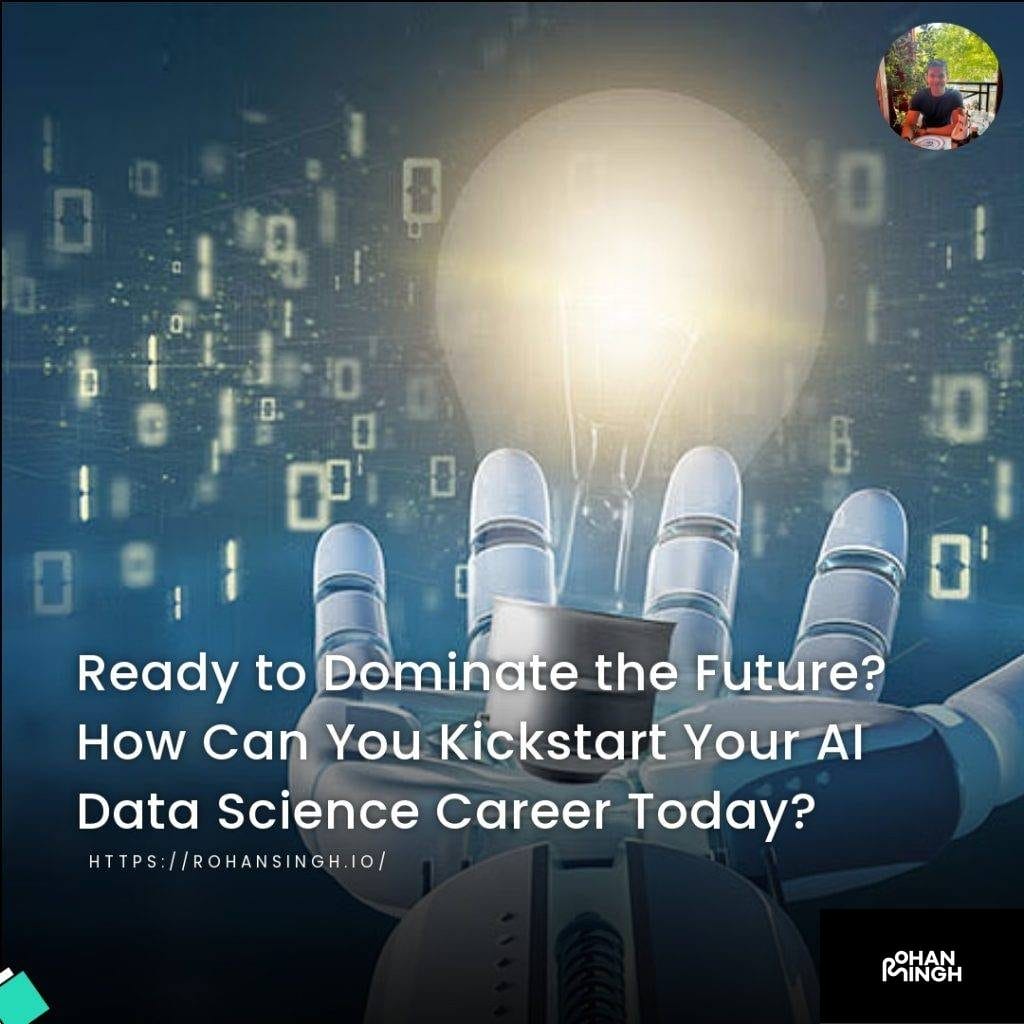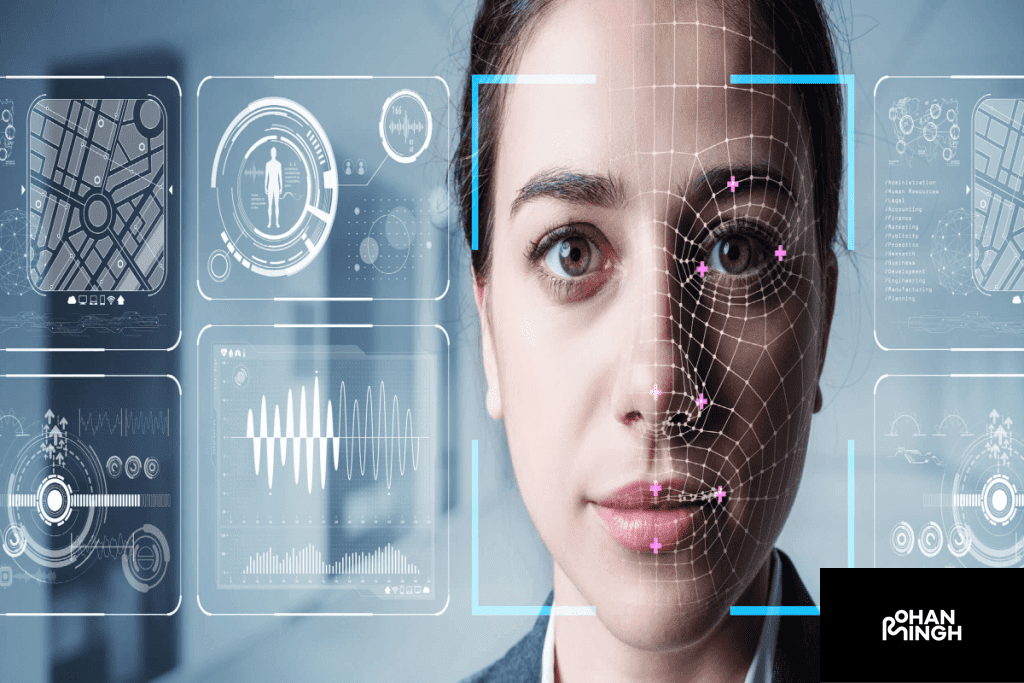Ready to Dominate the Future? How Can You Kickstart Your AI Data Science Career Today?

What is Artificial Intelligence?
Artificial Intelligence (AI) is a rapidly growing field that focuses on developing intelligent systems that can perform tasks that typically require human intelligence. It involves building computer programs that can learn, reason, and apply knowledge to solve complex problems. AI encompasses various areas such as machine learning, natural language processing, and robotics, among others. Machine learning, a subset of AI, enables computers to learn from data and improve their performance over time without explicit programming. AI finds practical applications in self-driving cars, speech recognition, predictive models, and many other real-world problems. As AI continues to advance, the demand for skilled professionals in this field is on the rise. A career in AI and data science requires a strong understanding of statistics, programming skills in popular languages such as Python and R, and mathematical skills.
Table of Contents
ToggleWhat is Data Science?
Data Science is a crucial component of the field of Artificial Intelligence (AI) that plays a fundamental role in enabling machines to mimic human intelligence. Data scientists utilize their skills to collect, clean, analyze, and interpret large and complex datasets. By doing so, they gain valuable insights that translate into tangible solutions for real-world problems.
In the realm of AI, data scientists are responsible for solving complex problems. They leverage their expertise in machine learning and statistical analysis to build algorithms that uncover patterns within the data. These patterns allow machines to make predictions, recognize speech, develop self-driving cars, and perform numerous other tasks.
Data scientists possess a unique skill set that combines technical prowess with an understanding of statistics. They possess programming skills in popular languages like Python and R, which enable them to process and manipulate data effectively. Moreover, they have in-depth knowledge of machine learning techniques and are adept at using tools and libraries like TensorFlow and Scikit-learn.
A career in Data Science offers exciting opportunities as the demand for skilled professionals continues to rise. With their ability to solve complex problems using cutting-edge technology, data scientists are highly sought after in industries ranging from healthcare and finance to marketing and e-commerce.
Data Science is a vital discipline within AI that empowers machines to analyze and interpret complex datasets. Data scientists play a key role in developing algorithms that allow machines to mimic human intelligence, making it an exciting and rewarding career path.
Let's talk about your future project!
Eager to collaborate on your upcoming endeavor? Let's explore and ignite the potential of your next big idea, shaping a promising future together!
The Role of AI and Data Science in Our World Today
AI and Data Science have become vital components in our world today, revolutionizing various industries and transforming the way we live and work. With the advancements in AI technology, we are witnessing a paradigm shift in how we interact with machines and the level of automation we can achieve.
In the realm of search engines, AI algorithms analyze vast amounts of data to provide personalized and accurate query suggestions in real-time. Image recognition powered by AI enables the automatic tagging and categorization of images, making it easier to search for specific visual content. Chatbots, the AI-powered virtual assistants, effectively handle customer queries, providing instant responses and enhancing customer service experiences. AI technology is also incorporating smart home appliances, allowing us to control and operate various devices using voice commands or through mobile applications.
The application of AI extends beyond consumer-focused areas. Industries such as healthcare, finance, and manufacturing are harnessing the power of AI and data science to improve efficiency and make smarter decisions. From diagnosing diseases using medical imaging to detecting fraudulent activities in financial transactions, AI technology has the potential to transform these sectors.
According to a report by McKinsey Global Institute, the AI market is estimated to generate around $13 trillion in value by 2030. This exponential growth is driving the demand for AI specialists who possess the necessary skill sets to develop and implement AI solutions. As industries across the board recognize the potential of AI, there is a pressing need for professionals with expertise in AI technology to fill these roles.
AI and Data Science have emerged as game-changers in various industries, reshaping our world and enabling new possibilities. The integration of AI technology into everyday life and business processes is driving the demand for AI specialists, making a career in AI Data Science a promising path for those seeking to contribute to the cutting edge of technology.

Understanding the Skills Required for a Career in AI and Data Science
AI and data science have become key drivers of innovation and efficiency in various industries. As the demand for AI specialists continues to grow, it is crucial to understand the essential skills required to embark on a successful career in this field. Technical proficiency plays a vital role, with a strong foundation in programming languages like Python, R, and Java being crucial. Additionally, a deep understanding of statistics and mathematical skills is necessary to develop and implement advanced machine learning algorithms and predictive models. Familiarity with machine learning techniques, such as supervised learning, unsupervised learning, and reinforcement learning, is essential for creating AI solutions. Moreover, knowledge of popular deep learning frameworks and libraries like TensorFlow and PyTorch is also beneficial. To excel in this field, individuals must possess strong problem-solving and critical thinking skills, as they will often be tasked with solving complex real-world problems using AI technology. Effective communication and collaboration skills are also vital, as AI specialists often work closely with cross-functional teams to develop and implement AI solutions. By acquiring these skills, individuals can pave the way for a successful and rewarding career in AI and data science.
Machine Learning Engineers
Machine learning engineers play a pivotal role in the field of AI and data science. Their main responsibility is to create and manage AI systems and develop predictive models. These professionals work closely with data scientists to understand the specific requirements and goals of a project.
Machine learning engineers are well-versed in various programming languages and possess strong technical skills. They use their expertise to design and implement complex algorithms that can analyze and process large sets of data. By leveraging their knowledge of machine learning techniques, such as supervised and unsupervised learning, they develop models that can make accurate predictions and provide valuable insights.
Collaboration is a key aspect of a machine learning engineer’s role. They work closely with data scientists to ensure that the models they develop align with the project objectives. This collaboration enables them to refine and enhance the models to achieve optimal performance.
Additionally, machine learning engineers strive to improve the efficiency and scalability of AI systems. They explore and utilize cutting-edge technologies and tools, such as TensorFlow and PyTorch, to streamline the development and deployment processes.
Machine learning engineers are vital in the realm of AI and data science. Their expertise in developing AI systems and managing predictive models, coupled with their collaboration with data scientists, contributes to the successful implementation of AI solutions in various industries.
Speech Recognition
Speech recognition is a crucial component of artificial intelligence and data science that enables machines to understand and interpret spoken language. This technology plays a vital role in applications like voice assistants, transcription services, and even self-driving cars.
Speech recognition technology utilizes machine learning algorithms to convert spoken words into written text. These algorithms are trained on vast amounts of data, which helps them learn patterns in human speech. As the algorithms are exposed to more data, they become more accurate in interpreting and transcribing spoken language.
The importance of speech recognition in AI and data science cannot be overstated. It allows us to interact with technology more naturally, enabling voice-controlled devices and applications. Voice assistants like Siri and Alexa have become an integral part of our daily lives, providing us with information, setting reminders, and even controlling smart home devices.
Furthermore, speech recognition technology has applications in industries such as healthcare, finance, and customer service. Transcription services powered by speech recognition have made the process of converting audio into written text faster and more efficient.
The advancements in speech recognition fueled by machine learning algorithms have revolutionized the way we interact with technology. By accurately converting spoken language into written text, speech recognition opens up endless possibilities for artificial intelligence and data science.

Predictive Models
Predictive models are a crucial component of artificial intelligence (AI) and data science, enabling organizations to make accurate predictions and forecasts based on historical data. These models utilize machine learning algorithms to analyze patterns and relationships within the data, allowing for predictions to be made for future outcomes.
The process of building predictive models involves training and testing. First, historical data is collected, which serves as the foundation for training the model. This data is used to identify patterns and correlations, and the model learns from this information. The model is then tested using a separate dataset to evaluate its accuracy and performance in making predictions.
Various types of predictive models are commonly used in AI and data science, including regression models, classification models, and time series forecasting models. Regression models are used when the outcome variable is continuous and can be used to predict values such as sales figures or stock prices. Classification models are used when the outcome variable is categorical and can be used to predict classes such as customer churn or fraud detection. Time series forecasting models are used when there is a temporal aspect to the data, allowing for predictions to be made based on historical trends.
Predictive models play a crucial role in artificial intelligence and data science by leveraging historical data to make accurate predictions and forecasts. These models enable organizations to gain valuable insights and make informed decisions, leading to improved business outcomes.
Natural Language Processing (NLP)
Natural Language Processing (NLP) is a field of artificial intelligence (AI) and data science that focuses on analyzing, understanding, and generating human language using computer algorithms and models. It enables machines to process and comprehend natural language, allowing for applications such as sentiment analysis, information extraction, and question answering.
One of the key applications of NLP is sentiment analysis, which involves determining the overall sentiment or opinion expressed in a piece of text. This can be useful for monitoring customer feedback, analyzing social media sentiments, or understanding public opinion on various topics. NLP algorithms can analyze the language used in a text and classify it as positive, negative, or neutral, providing valuable insights for businesses and organizations.
Another application of NLP is information extraction, which involves automatically extracting structured information from unstructured text. This can include extracting key entities, relationships, or events from documents, emails, or web pages. NLP techniques enable machines to identify and categorize relevant information, making it easier to process and analyze large volumes of textual data.
Furthermore, NLP plays a crucial role in question answering systems, where machines are trained to understand and respond to questions posed in natural language. It involves the use of algorithms and models to analyze the input question, search for relevant information, and generate an appropriate response.
NLP is a powerful tool in the field of AI and data science, enabling machines to analyze, understand, and generate human language. Its applications in sentiment analysis, information extraction, and question answering make it a valuable asset for businesses and organizations in various industries.
Programming Languages
To start a successful career in AI and Data Science, it is essential to have a strong foundation in programming languages. There are several programming languages that are widely used in the field, each serving a specific purpose and offering unique advantages.
Python is the go-to language for many AI and Data Science professionals. Its simplicity and readability make it an ideal language for beginners. Python’s vast set of libraries and frameworks, such as TensorFlow and PyTorch, have made it the preferred choice for developing machine learning models and implementing deep learning algorithms. With its extensive community support and ease of use, Python continues to dominate the AI and Data Science landscape.
C++ is another language that holds significant importance in the field. Known for its speed and efficiency, C++ is often used for developing complex algorithms and implementing high-performance applications. It is particularly useful when working with large-scale datasets and real-time systems where low latency is crucial.
Java, with its cross-platform capabilities, is widely utilized in building enterprise-level AI solutions. Its robustness and scalability make it a popular choice for developing applications that require high performance and reliability.
R is a programming language specifically designed for statistical analysis and visualizations. It is extensively used in Data Science for data manipulation, exploratory data analysis, and statistical modeling. R’s rich ecosystem of packages, including ggplot2 and dplyr, makes it a powerful tool for data scientists.
To have a successful AI and Data Science career, a good command of these programming languages, particularly Python, is essential. The ability to effectively use these languages allows data scientists and AI professionals to implement machine learning techniques, develop complex algorithms, and build practical applications that leverage the power of AI and Data Science.

Understanding of Statistics and Mathematics
Understanding statistics and mathematics is of paramount importance in the field of AI and data science. These disciplines provide the foundation for making sense of large data sets and building effective machine learning models.
Statistics plays a crucial role in analyzing and interpreting data. It enables data scientists to uncover patterns, trends, and insights that can inform decision-making processes. By using statistical techniques, professionals can draw meaningful conclusions from complex data sets, resulting in accurate predictions and actionable insights.
Mathematical skills, including proficiency in probability theory, are essential for creating AI models. Probability is the key to understanding uncertainty and randomness in data. It allows data scientists to quantify the likelihood of events and assess the confidence of predictions made by machine learning algorithms.
In AI and data science, a solid understanding of statistics and mathematics empowers professionals to approach problems with a data-driven mindset. This knowledge ensures that models are built on sound principles and that the results obtained are reliable and meaningful. Therefore, aspiring AI and data science professionals should focus on developing their expertise in statistics and mathematics to excel in this rapidly growing field.
Statistics and mathematics form the backbone of AI and data science. Proficiency in these disciplines is essential for analyzing data, building accurate models, and making informed decisions. By honing their understanding of statistics and mathematics, individuals can pave the way for a successful career in AI and data science.
Technical Skills
To embark on a successful AI Data Science career, individuals need to acquire a range of crucial technical skills. Mastery of programming languages is essential, as it forms the foundation for implementing AI algorithms and building data-driven solutions. Python, R, and Java are popular choices due to their extensive libraries and frameworks tailored for data analysis and machine learning.
An understanding of statistics and mathematics is pivotal in extracting insights from complex datasets. Proficiency in statistical techniques enables data scientists to uncover patterns, relationships, and trends within the data. Moreover, it empowers them to construct accurate predictive models and make data-driven decisions.
A deep familiarity with machine learning techniques is fundamental for AI Data Science professionals. This includes knowledge of supervised and unsupervised learning algorithms, as well as reinforcement learning. The ability to select and deploy appropriate algorithms to solve real-world problems is crucial.
Additionally, expertise in deep learning frameworks such as TensorFlow and PyTorch is in high demand. These frameworks enable the construction and training of deep neural networks, which possess remarkable capabilities in areas like image recognition, natural language processing, and speech recognition.
Overall, a strong technical foundation encompassing programming languages, statistics and mathematics, machine learning techniques, and deep learning frameworks is key to carving out a successful AI Data Science career. By acquiring and honing these skills, professionals can contribute to cutting-edge advancements in the field and thrive in the ever-growing AI job market.
Human Language and Communication Skills
In the field of AI Data Science, human language and communication skills are of paramount importance. While technical skills and knowledge are crucial for success in this field, the ability to effectively communicate complex thoughts and concepts to a wide audience is equally vital.
AI Data Science professionals often need to convey their findings, insights, and recommendations to non-technical stakeholders, such as business executives or policymakers. They must be able to articulate the implications of their work in a clear and concise manner, ensuring that decision-makers understand the value and impact of their findings.
Moreover, teamwork plays a significant role in AI Data Science projects. Collaborating with colleagues from diverse backgrounds, such as software engineers, mathematicians, and domain experts, requires strong communication skills. The ability to listen and understand different perspectives, as well as articulate one’s ideas and insights, fosters effective collaboration and can lead to innovative solutions.
Furthermore, business intelligence and critical thinking skills are essential for transforming technological ideas into successful commercial ventures. Data scientists need to understand the business context and identify opportunities where AI and Data Science can add value. Effective communication with business stakeholders is crucial for demonstrating the potential impact of these technologies, securing support, and driving successful implementation.
In summary, while technical skills are fundamental for AI Data Science professionals, the ability to communicate complex ideas, collaborate effectively, and think critically about the business implications is equally important. Developing strong human language and communication skills is essential for a successful career in AI Data Science.

Preparing for a Job in AI and Data Science
Artificial Intelligence (AI) and Data Science are rapidly growing fields with immense potential for career opportunities. As the demand for AI and Data Science professionals continues to rise, it is crucial to effectively prepare for a job in this exciting and lucrative industry. Here are some essential steps to set yourself up for success in an AI Data Science career.
Firstly, acquiring the necessary technical skills is vital. Proficiency in programming languages such as Python, R, or Java is indispensable for building and implementing AI algorithms and models. Additionally, a solid understanding of statistics and mathematical skills are essential for working with complex data sets. Familiarize yourself with machine learning techniques, deep learning frameworks, and data visualization tools to enhance your skill set further.
Hands-on experience is also crucial in gaining a competitive edge in the job market. Participate in projects that allow you to apply your knowledge and solve real-world problems using AI and Data Science. Utilize popular applications and tools like TensorFlow, PyTorch, or scikit-learn to build predictive models, develop natural language processing systems, or work on speech recognition algorithms. Practical experience not only builds your portfolio but also enhances your understanding and proficiency in AI and Data Science.
Building a strong foundation in AI and Data Science requires continuous learning and staying updated on the latest trends and advancements. Enroll in online courses, attend workshops, and join communities dedicated to AI and Data Science. Expanding your knowledge and staying abreast of cutting-edge technologies and methodologies will demonstrate your dedication to the field and make you a valuable asset to potential employers.
Pursuing a successful AI Data Science career requires a combination of technical skills, practical experience, and continuous learning. By focusing on acquiring the necessary expertise, gaining hands-on experience, and staying updated on emerging trends, you can position yourself for an exciting and rewarding career in AI and Data Science.
Developing Your Skill Set
To excel in the field of AI and Data Science, it is crucial to develop a strong skill set that combines technical expertise, statistical knowledge, and domain-specific understanding. Here are some essential skills that will help you build a solid foundation for a successful career in AI Data Science.
1. Programming Languages:
Proficiency in programming languages like Python, R, or Java is essential in AI and Data Science. These languages enable you to develop and implement AI algorithms and models efficiently. Python, in particular, is widely used due to its versatility and the availability of extensive libraries and frameworks like TensorFlow and scikit-learn.
2. Statistics:
A strong understanding of statistics is vital in interpreting data and making accurate predictions. Statistical concepts like regression analysis, hypothesis testing, and probability theory are fundamental in building and evaluating AI models. Being proficient in statistical analysis helps you make informed decisions and develop robust predictive models.
3. Mathematics:
Mathematical skills are the backbone of AI and Data Science. Concepts like linear algebra, calculus, and optimization algorithms are essential in understanding and developing complex algorithms. Mathematical proficiency allows you to work with large datasets, find patterns, and optimize solutions efficiently.
4. Technical Skills:
Besides programming, technical skills like data preprocessing, feature engineering, and data visualization are crucial. Knowing how to clean and format data, extract important features, and present insights visually enhances your ability to analyze and communicate results effectively.
5. Domain Knowledge:
Developing in-depth understanding and domain-specific knowledge is vital to solve real-world problems using AI and Data Science. Collaborating with industry experts and understanding the nuances of the business or industry you are working in helps you tailor your solutions and make a significant impact.
By honing your skills in programming languages, statistics, mathematics, technical know-how, and domain expertise, you can establish a strong foundation for a successful AI Data Science career. Keep learning and staying updated with the latest tools, technologies, and methodologies to ensure you remain at the forefront of this rapidly evolving field.
Getting Hands-on Experience
Acquiring practical experience is vital in the field of AI Data Science. It not only helps you gain a deeper understanding of the concepts but also enhances your problem-solving skills. Participating in projects, hackathons, and online courses and bootcamps are excellent ways to gain hands-on experience.
Working on real-world projects allows you to apply the knowledge and skills you have acquired. It gives you the opportunity to tackle complex data sets and develop solutions that have practical applications. Moreover, it helps you understand the challenges and nuances of working with real data, which is crucial in AI Data Science.
Hackathons are intense competitions that require participants to come up with innovative solutions within a limited timeframe. These events provide an immersive learning experience and allow you to collaborate with other AI enthusiasts. It also exposes you to cutting-edge technologies and helps you stay updated with the latest advancements in the field.
Online courses and bootcamps offer structured learning modules and provide hands-on training. They cover topics like AI algorithms, machine learning techniques, and deep learning frameworks. By participating in these programs, you can develop practical skills and gain technical expertise.
To excel in the AI Data Science career, it is essential to continuously learn and adapt to new tools and technologies. By gaining practical experience through projects, hackathons, and online courses, you can enhance your skill set and set yourself up for success in this rapidly evolving field.

Conclusion
A career in Artificial Intelligence (AI) Data Science offers immense opportunities and future prospects. The field of AI and Machine Learning (ML) continues to grow rapidly, shaping the way we interact with technology and revolutionizing industries such as healthcare, finance, and transportation.
Professionals with the right skill set in AI Data Science are in high demand. Tech giants like Google, Facebook, and Microsoft are constantly seeking talented individuals to drive their AI initiatives forward. According to recent statistics, the job market for AI Data Scientists is projected to witness a significant growth rate in the coming years, with an increasing number of companies incorporating AI into their operations.
Investing in education and skill development is crucial to succeed in this competitive field. Professionals should focus on acquiring a strong understanding of AI concepts, machine learning algorithms, and programming languages such as Python and R. Hands-on experience through projects, hackathons, and online courses is essential to gain practical expertise and stay updated with the latest advancements in AI and ML.
In conclusion, a career in AI Data Science presents numerous opportunities for individuals with the right skill set. By staying proactive, continuously learning, and honing their AI expertise, professionals can position themselves for success in this dynamic and rapidly evolving field. So, take the leap into a rewarding AI Data Science career and be a part of the transformative journey of artificial intelligence.
FAQ's
What are some recommended learning resources to start a career in AI Data Science?
To begin your AI Data Science career, it is important to have a strong educational foundation. Some popular learning resources include online courses like Andrew Ng’s “Machine Learning” and “Deep Learning” on Coursera, as well as free online tutorials and webinars offered by organizations like the AI Data Science Career Institute.
What are the essential tools and frameworks that I should be familiar with?
To excel in AI Data Science, it is essential to possess knowledge of tools and frameworks such as Python, R, TensorFlow, and PyTorch. These tools enable you to work with large data sets, build models, and deploy AI solutions.
How can I gain hands-on experience in AI Data Science?
Gaining practical experience is crucial to succeed in this field. You can gain hands-on experience by working on personal projects, participating in hackathons, and collaborating on real-world AI Data Science projects. Additionally, internships and research opportunities provide valuable experience and exposure to industry best practices.
Is there an age limitation for starting a career in AI Data Science?
No, there is no age limitation for starting a career in AI Data Science. People from diverse backgrounds and experiences are entering this field at various stages of their professional lives.
Can I start a tech startup in AI Data Science?
Absolutely! AI Data Science offers a plethora of opportunities for tech startups. With the rapid growth of AI technologies and their practical applications in various industries, starting a tech startup focused on AI Data Science can be a rewarding venture.
Similar articles about Acquisition Strategy:
Ready to Plan Your Dream Trip with ChatGPT Vacation Planner?, Want to Experience the Magic of Third-Party ChatGPT Plugins?, How can Efficient Project Management Boost Your Success?, Looking to Boost Your YouTube Views? Use ChatGPT for Top-Notch Video Optimization!
Are You Leveraging SEO Audits to Win More Clients?, Ever Thought of Starting an AI Career? Discover How Today!, Can SEO Propel Your Store to 1 Million Monthly Visitors?, How Can Google Bard Supercharge Your SEO Content Strategy?
Eager to Multiply Local Business Reviews from Travelers?, Which is the Best AI Chatbot? A Head-to-Head Comparison of ChatGPT, Claude 2, Bing Chat, and Google Bard, Want a Game-Changer in SEO? Have You Tried AI and Chrome Extensions Yet?,
Can AI-Powered Growth Spark Your Business Acceleration and Digital Transformation?, Ready to Achieve SEO Mastery and Stand Out in the Digital World?, Ready to Dominate the Future? How Can You Kickstart Your AI Data Science Career Today?, Want to Dominate Google SERP? Learn How to Supercharge Your Content Strategy!, Have You Explored the ChatGPT Android App Yet?
Ready to Supercharge Your Business? Harness the Power of Always-On PPC Strategy Now!
What Marketing Strategy Did Cheetos Employ for Plants vs. Zombies Collaboration?
Rohan Singh | May 1, 2024 | Acquisition What Marketing Strategy Did Cheetos Employ for Plants vs. Zombies Collaboration? Background on Cheetos Cheetos, a popular brand of cheese-flavored snacks, has made a name for itself with its bold and playful marketing strategies. Known for its irreverent and creative campaigns, Cheetos has consistently found unique ways […]
What Marketing Strategy Did Cheetos Employ for Plants vs. Zombies Collaboration?
Rohan Singh | May 1, 2024 | Acquisition What Marketing Strategy Did Cheetos Employ for Plants vs. Zombies Collaboration? Background on Cheetos Cheetos, a popular brand of cheese-flavored snacks, has made a name for itself with its bold and playful marketing strategies. Known for its irreverent and creative campaigns, Cheetos has consistently found unique ways […]
What Differentiates Differentiated Marketing Strategy from Undifferentiated?
Rohan Singh | April 30, 2024 | Acquisition What Differentiates Differentiated Marketing Strategy from Undifferentiated? Definition of Differentiated Marketing Strategy A differentiated marketing strategy is a targeted approach that focuses on creating unique products or services to meet the specific needs and preferences of different customer segments. It recognizes that customers have diverse tastes, preferences, […]
What Sets Apart the Marketing Concept from a Marketing Strategy?
Rohan Singh | April 29, 2024 | Acquisition What Sets Apart the Marketing Concept from a Marketing Strategy? Definition of Marketing Concept The marketing concept is a philosophy that places the customer at the center of all marketing activities. It focuses on understanding the needs and wants of the target market and delivering value to […]
Which promotional mix strategy targets market channel members?
Rohan Singh | April 28, 2024 | Acquisition Which promotional mix strategy targets market channel members? When it comes to promoting a product or service, companies utilize various strategies to reach their target audiences. One key strategy that directs marketing efforts toward market channel members is known as trade promotion. Trade promotion is a type […]
Should charter schools adopt regional or national marketing strategies?
Rohan Singh | April 27, 2024 | Acquisition Should charter schools adopt regional or national marketing strategies? Purpose When it comes to marketing strategy in the field of charter schools, two broad approaches can be taken: regional and national. Each approach has its purpose and benefits depending on the goals and aspirations of the charter […]
Topics :
Share :






